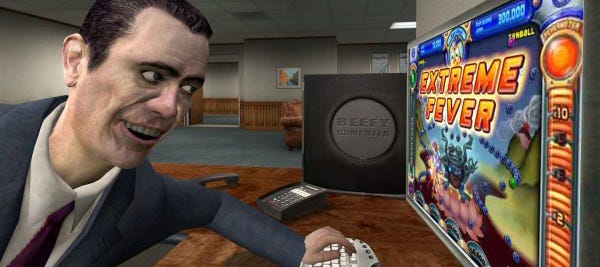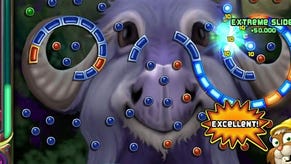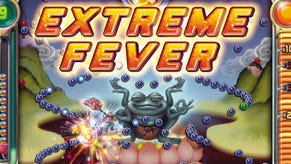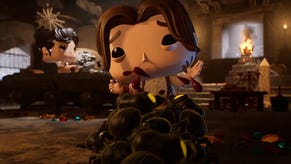Peggle Is Good For You
The real purpose of press releases is to issue outrageous statements to as many journalists as possible in the hope they'll namecheck you when they inevitably repeat it. And hey, it works. Popcap send me a release saying stuff like "Bejeweled 2 and Peggle were shown to reduce anger by 65% and 63% respectively" - of course I'm going to post that.
It's all part of a study (involving 132 subjects) by East Carolina University as to the positive effects of playing casual games. Test subjects were given a raft of Popcap games to play, so, quite understandably, Popcap is now giving props to itself.
This is, however, actualish science, not spurious "our tealady only smiles when playing Chuzzle" stuff.
Says Dr. Caremen Russoniello, associate professor and director of the Psychophysiology and Biofeedback Center at ECU:
"I’ve conducted many clinical studies in the area of recreational therapy in the past, but this was the first one seeking to determine the potential therapeutic value of video games. The results of this study are impressive and intriguing, given the extent of the effects of the games on subjects’ stress levels and overall mood.
When coupled with the very high degree of confidence we have in those results based on the methodology and technologies used, I believe there is a wide range of therapeutic applications of casual games in mood-related disorders such as depression and in stress-related disorders including diabetes and cardiovascular disease.
Granted, this study was a first step and much more needs to be done before video games can be prescribed to treat medical conditions. However, these exciting results confirm anecdotal evidence that people are playing casual video games to improve their mood and decrease their stress, and herald casual games’ potential in health promotion, disease prevention, and treatment of stress- and mood-related disorders."
Only Bejeweled had a significant effect on stress, but a slew of mood-affecting factors were tested for: psychological tension, anger, depression, vigour, fatigue and the amusingly nebulous 'confusion.' Peggle was clear champ, improving the total 'mood' by 573% across all study subjects, followed by Bejeweled 2 at 435% and Bookworm Adventures at 303%. Dr Russoniello notes this about Peggle's 45% reduction of depression: "If these games can reduce depression this significantly among a population of people who are not diagnosed with depression, the potential for positively affecting the mental state of someone who is in fact depressed is very significant."
Which is great - if it proves true, and not one-off number-fun. PC gaming is good for you is certainly a dream headline for a medium that consistently has to defend itself against accusations that it turns people into slovenly psychopaths. In terms of what to take from this lone test right now though, I don't know how much it's genuinely proven. But I'm a cynic, not a scientist. I'll admit that casual games - Peggle and Audiosurf specifically - tend to be my first recourse when I'm feeling a bit down or hungover, but had presumed that's more to do with their undemanding simplicity than because I think they'll make me feel better.
As for the Popcap element, I do find myself wishing the test had involved a broader spectrum of games. Not so much because it comes across a little like a promotional stunt, but rather because Popcap's eyewateringly profitable place at the top of the casual foodchain means its games are that much more cash-injected, and thus polished, than much of the competition.
I suspect a lot more time, energy and focus grouping goes into making sure their games incite delight, and never frustration, than does into Random Shockwave Bejeweled clone #4324. The ever-escalating notes, the regular sense of accomplishment, the invisible learning curve, the lack of punishment... In other words, Popcap's casual games - or at least the three gems in this test - are pretty much the pinnacle of the form today. What would the results have been like if Puzzle Quest and its cheaty AI was in there, for instance?
So, 'games make you happier', or even just 'casual games make you happier', is sadly far too broad a declaration to make - like saying 'games make you savagely beat up journalists' when the only game in the study was "Kieron Says Horrifyingly Insulting Things About Your Mum VII". Which is great news for Popcap, of course, but I do hope there's a follow-up test with a whole buncha stuff in it.












.jpg?width=291&height=164&fit=crop&quality=80&format=jpg&auto=webp)


